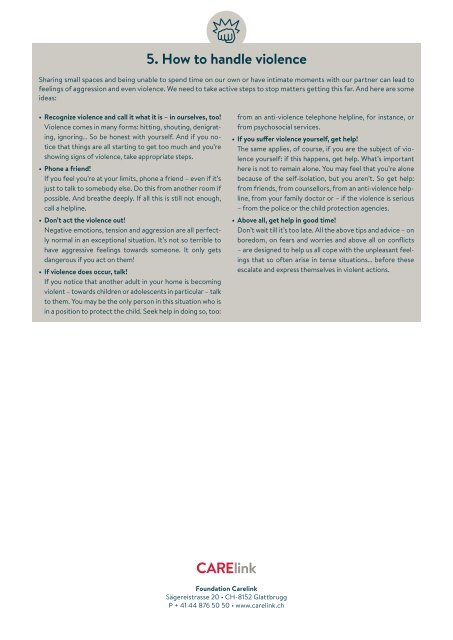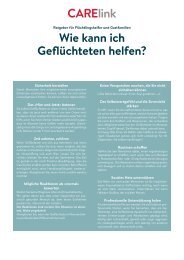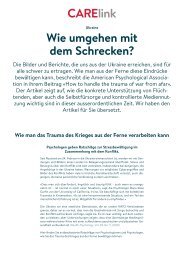Covid-19 : Self-isolation and quarantine
Self-isolation and quarantine are exceptional situations that most of us will never have faced before.
Self-isolation and quarantine are exceptional situations that most of us will never have faced before.
- No tags were found...
Create successful ePaper yourself
Turn your PDF publications into a flip-book with our unique Google optimized e-Paper software.
5. How to h<strong>and</strong>le violence<br />
Sharing small spaces <strong>and</strong> being unable to spend time on our own or have intimate moments with our partner can lead to<br />
feelings of aggression <strong>and</strong> even violence. We need to take active steps to stop matters getting this far. And here are some<br />
ideas:<br />
• Recognize violence <strong>and</strong> call it what it is – in ourselves, too!<br />
Violence comes in many forms: hitting, shouting, denigrating,<br />
ignoring… So be honest with yourself. And if you notice<br />
that things are all starting to get too much <strong>and</strong> you’re<br />
showing signs of violence, take appropriate steps.<br />
• Phone a friend!<br />
If you feel you’re at your limits, phone a friend – even if it’s<br />
just to talk to somebody else. Do this from another room if<br />
possible. And breathe deeply. If all this is still not enough,<br />
call a helpline.<br />
• Don’t act the violence out!<br />
Negative emotions, tension <strong>and</strong> aggression are all perfectly<br />
normal in an exceptional situation. It’s not so terrible to<br />
have aggressive feelings towards someone. It only gets<br />
dangerous if you act on them!<br />
• If violence does occur, talk!<br />
If you notice that another adult in your home is becoming<br />
violent – towards children or adolescents in particular – talk<br />
to them. You may be the only person in this situation who is<br />
in a position to protect the child. Seek help in doing so, too:<br />
from an anti-violence telephone helpline, for instance, or<br />
from psychosocial services.<br />
• If you suffer violence yourself, get help!<br />
The same applies, of course, if you are the subject of violence<br />
yourself: if this happens, get help. What’s important<br />
here is not to remain alone. You may feel that you’re alone<br />
because of the self-<strong>isolation</strong>, but you aren’t. So get help:<br />
from friends, from counsellors, from an anti-violence helpline,<br />
from your family doctor or – if the violence is serious<br />
– from the police or the child protection agencies.<br />
• Above all, get help in good time!<br />
Don’t wait till it’s too late. All the above tips <strong>and</strong> advice – on<br />
boredom, on fears <strong>and</strong> worries <strong>and</strong> above all on conflicts<br />
– are designed to help us all cope with the unpleasant feelings<br />
that so often arise in tense situations… before these<br />
escalate <strong>and</strong> express themselves in violent actions.<br />
Foundation Carelink<br />
Sägereistrasse 20 • CH-8152 Glattbrugg<br />
P + 41 44 876 50 50 • www.carelink.ch

















